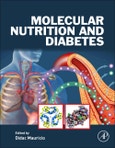Molecular Nutrition and Diabetes: A Volume in the Molecular Nutrition Series focuses on diabetes as a nutritional problem and its important metabolic consequences. Fuel metabolism and dietary supply all influence the outcome of diabetes, but understanding the pathogenesis of the diabetic process is a prelude to better nutritional control.
Part One of the book provides general coverage of nutrition and diabetes in terms of dietary patterns, insulin resistance, and the glucose-insulin axis, while Part Two presents the molecular biology of diabetes and focuses on areas such as oxidative stress, mitochondrial function, insulin resistance, high-fat diets, nutriceuticals, and lipid accumulation. Final sections explore the genetic machinery behind diabetes and diabetic metabolism, including signaling pathways, gene expression, genome-wide association studies, and specific gene expression. While the main focus of each chapter is the basic and clinical research on diabetes as a nutritional problem, all chapters also end with a translational section on the implications for the nutritional control of diabetes.
Please Note: This is an On Demand product, delivery may take up to 11 working days after payment has been received.
Table of Contents
Section 1: General and Introductory Aspects
1. Nutrition and diabetes: general aspects
Ana M. Wägner, Julia Charlotte Wiebe, Rosa M. Sánchez-Hernández and Lidia García-Pérez
2. Dietary patterns and insulin resistance
Marcio A. Torsoni, Adriana Souza Torsoni and Marciane Milanski
3. Beta cell metabolism, insulin production and secretion; metabolic failure resulting in diabetes
Younan Chen, Vinicius Fernandes Cruzat and Philip Newsholme
4. Diet-gene interactions in the development of diabetes
Jose M. Ordovas
5. Pathogenesis of type 1 diabetes: role of dietary factors
Julie Christine Antvorskov, Karsten Buschard and Knud Josefsen
Section 2: Molecular biology of the cell
6. Oxidative stress in diabetes mellitus: molecular aspects: implications for the diet
Lu Cai
7. Muscle protein in type 2 diabetes: Molecular aspects
Antonio Zorzano
8. Mechanisms whereby wholegrain cereals modulate the prevention of type-2 diabetes
Knud Erik Bach Knudsen, Kjeld Hermansen, Mette Skou Hedemann and Merete Lindberg Hartvigsen
9. Peroxisome proliferator activated receptors -PPARs in glucose control
Massimo Collino and Fausto Chiazza
10. High-fat diets and beta-cell dysfunction: molecular aspects
Carla B. Collares-Buzato
11. Native fruits, anthocyanins in nutraceuticals and the insulin receptor/insulin receptor substrate-1/Akt/ forkhead box protein pathway
N.R.V. Dragano and Anne y Castro Marques
12. Influence of dietary factors on gut microbiota: role on insulin resistance and diabetes mellitus
Gemma Xifra Villarroya, Eduardo Esteve and J.M Fernandez-Real
13. Molecular aspects of Glucose regulation of pancreatic beta-cells
Rosa Gasa, Ramon Gomis, Anna Novials and Joan-Marc Servitja
14. Metals and signalling in diabetes
Lu Cai
15. Cocoa flavonoids and insulin signalling
Sonia Ramos, M.A. Martin and Luis Goya
16. Dietary proanthocyanidin modulation of pancreatic beta-cells: molecular aspects
Montserrat Pinent, Mayte Blay, Anna Ardevol and Noemi Gonzalez-Abuin
17. Dietary whey protein and Type 2 diabetes: molecular aspects
Jaime Amaya-Farfan, Priscila Neder Morato, Carolina Soares Moura and Pablo Lollo
18. Dietary fatty acids and C-reactive proteins in diabetes
Giovanni Annuzzi, Ettore Griffo, Giuseppina Costabile and Lutgarda Bozzetto
19. Alcoholic beverage and diabetes: cellular and molecular effects
Suzanne de la Monte
Section 3: Genetic machinery and its function
20. Alleles and risk of diabetes
Valeriya Lyssenko
21. Micro RNAs in diabetes
Louise Torp Dalgaard, Sofia Anna Salö, Anja Elaine Sørensen and Julian Geiger
22. Diabetes mellitus and intestinal Niemann-Pick C1-Like1 gene expression
W. A. Alrefai, Pooja Malhotra, Ravinder K. Gill and Pradeep K. Dudeja
23. Dietary long-chain omega-3 polyunsaturated fatty acids and inflammatory gene expression in type 2 diabetes
Manohar Lal Garg
24. Polymorphisms, carbohydrates, fat and type 2 diabetes: the example of insulin receptor substrate 1 (IRS1)
Jose Lopez-Miranda
25. Genetic basis linking variants for diabetes and obesity with breast cancer
Vijay Kumar Kutala
26. Genetic determinants of pathways underlying 25(OH) vitamin D deficiency predisposing to type 1 and type 2 diabetes mellitus
Dharambir K. Sanghera and Piers R. Blackett
27. NRF2-mediated gene regulation and glucose homeostasis
Masayuki Yamamoto and Akira Uruno
28. Hepatic mitochondrial fatty acid oxidation and type 2 diabetes
Abdelhak Mansouri, Wolfgang Langhans, Jean Girard and Carina Prip-Buus
29. The wnt signaling pathway and glucose homeostasis
T. Jin








